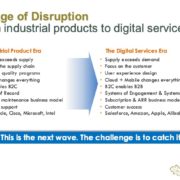In the digital world, intention creates sustainable business growth momentum
Is lack of a clear statement of intent slowing your business growth momentum? As companies of all sizes across all industries seek to successfully compete as digital enterprises, there is solid evidence of what separates success from failure. It turns out that the early leaders in the age of digital disruption share one thing in common…




